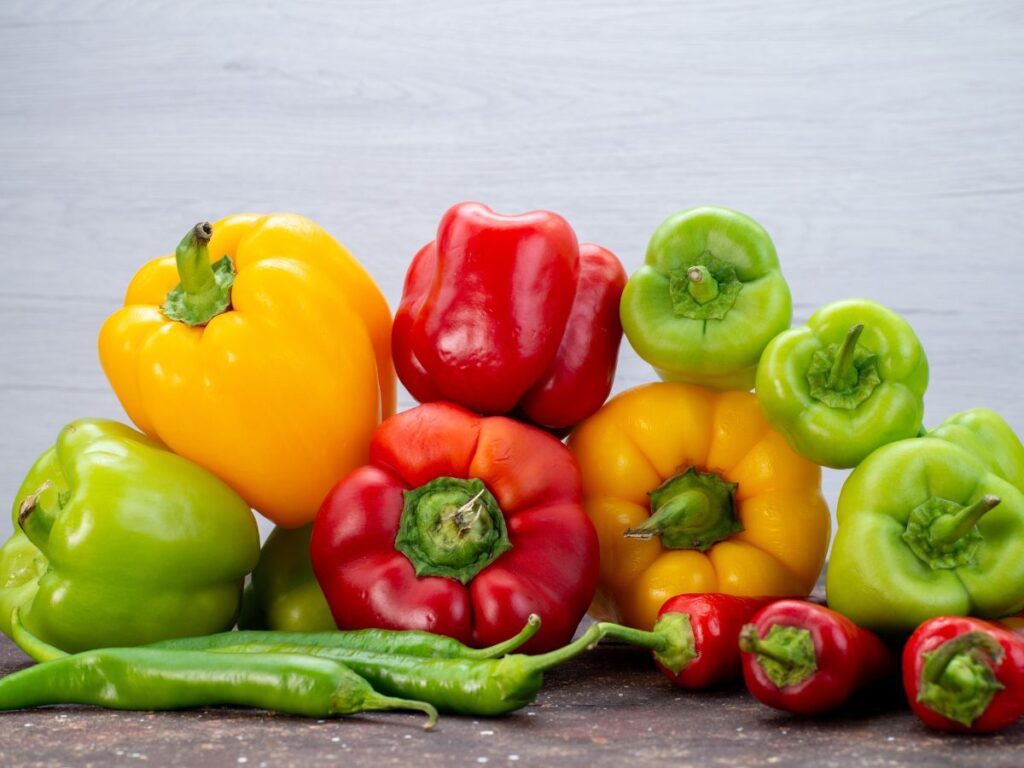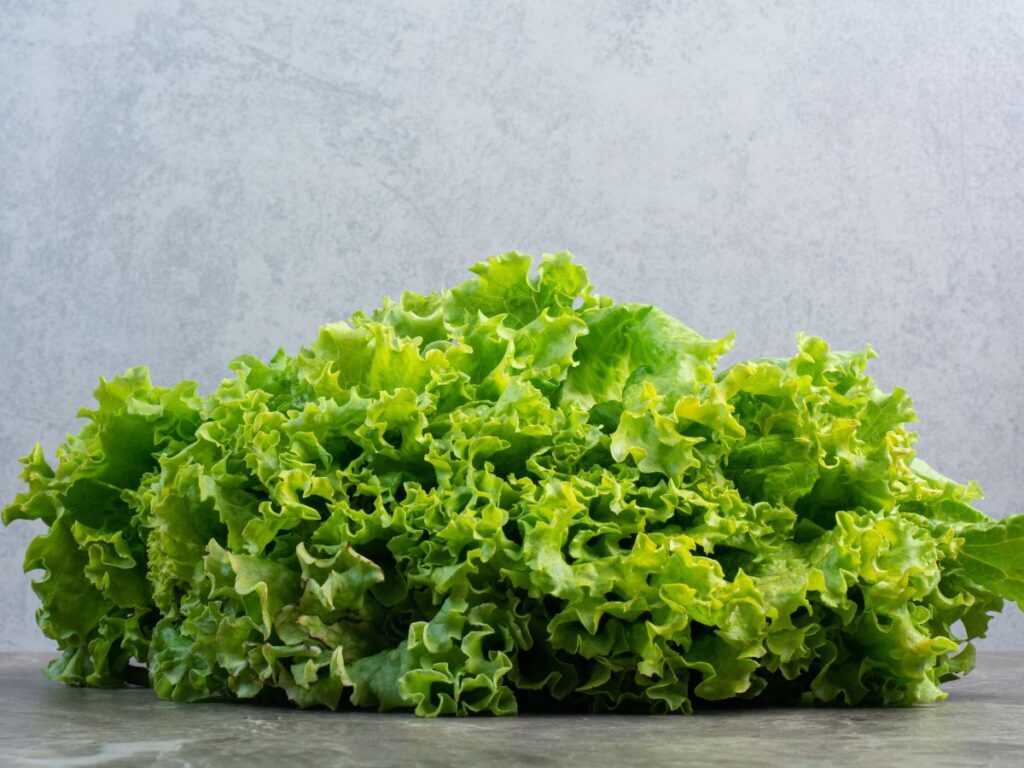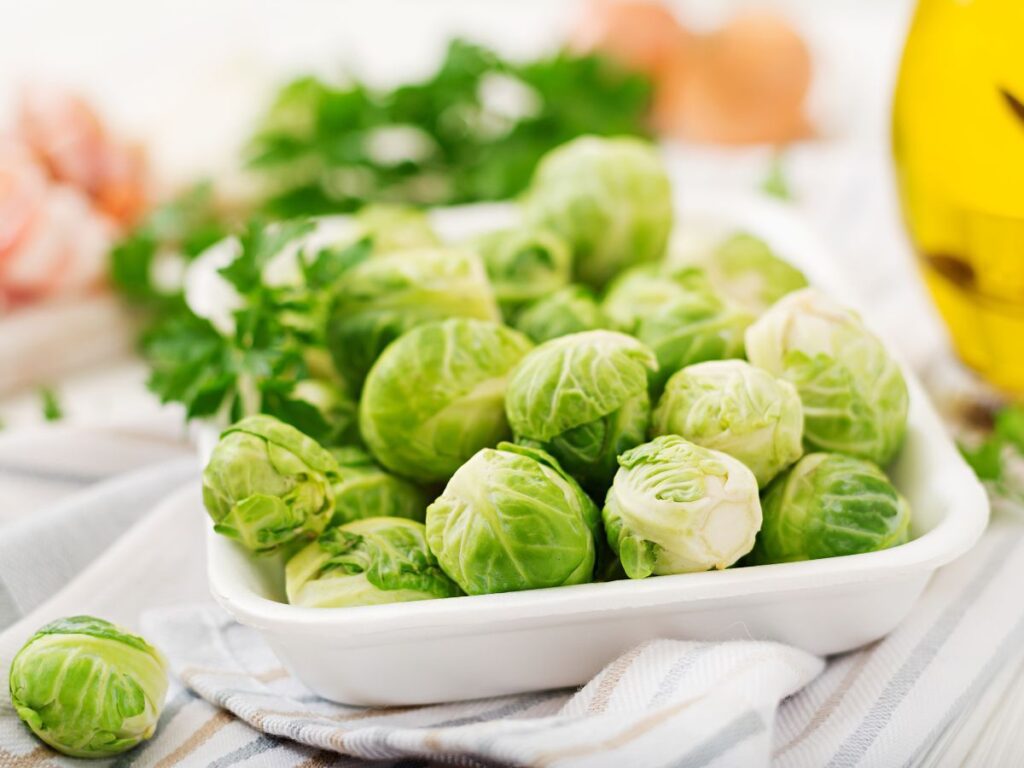Which Vegetables are good for eyes

Eating a diet rich in vegetables can benefit your overall health, including your eye health. Certain vegetables contain nutrients that can help protect your eyes from age-related diseases and improve your vision. Here are 10 vegetables that are particularly good for your eyes.
1. Carrots

1. Rich in Vitamin A: Carrots are a great source of beta-carotene, which gets converted to Vitamin A in the liver. Vitamin A is important for eye health as it helps in the formation of visual pigments and helps prevent age-related macular degeneration.
2. Antioxidants: Carrots are rich in antioxidants like lutein and zeaxanthin, which help protect the eyes from damage caused by free radicals.
3. Reduced risk of cataracts: A diet rich in beta-carotene has been linked to a reduced risk of cataracts, a common age-related eye problem.
4. Improved night vision: Due to the presence of Vitamin A, carrots can improve night vision. Vitamin A helps the eyes adjust to low light conditions.
5. Decreased risk of glaucoma: Glaucoma is a condition that damages the optic nerve, leading to vision loss. Some studies have shown that a diet rich in carrots can help reduce the risk of glaucoma.
6. Improved overall eye health: The various nutrients in carrots, like Vitamin A, C, K, and minerals like potassium and calcium, help improve overall eye health, making them an excellent food for maintaining and improving eyesight.
The right way to eat carrots to increase eyesight
To get the most benefits from carrots for your eyesight, it is best to eat them raw or lightly cooked. This is because heat can destroy some of the nutrients in carrots.
You can eat carrots on their own as a snack, or add them to salads, soups, or stir-fries. If you find raw carrots difficult to digest, try grating them and mixing them with other vegetables. You can also drink carrot juice as another way to enjoy this nutritious vegetable.
It’s important to note that while eating carrots can contribute to good eye health, they should not be relied upon as the sole solution for vision problems. Regular eye exams and a balanced diet that includes a variety of nutrients are also essential for maintaining good eyesight.
2. Spinach

1. Rich in carotenoids: Spinach is rich in carotenoids, including lutein and zeaxanthin, which are known to protect the eyes from damage caused by free radicals and reduce the risk of age-related macular degeneration (AMD).
2. High in antioxidants: Spinach contains powerful antioxidants such as vitamin C, vitamin E, and beta-carotene, which protect the eyes from oxidative stress and damage.
3. Good source of vitamins: Spinach is a good source of vitamins A, C, and K, which are essential for maintaining healthy eyesight.
4. Prevents cataracts and glaucoma: The high levels of vitamins and antioxidants in spinach can also prevent the development of cataracts and glaucoma, two common eye conditions.
5. Blood Circulation: Spinach can improve blood circulation, which can help improve eye health by delivering nutrients and oxygen to the eyes.
5. Lowers risk of eye infections: The vitamin A present in spinach can help prevent eye infections by keeping the surface of the eyes healthy.
The right way to eat spinach to increase eyesight
Spinach is a nutrient-rich leafy green vegetable that is known to improve eyesight due to its high content of lutein and zeaxanthin. These two antioxidants are essential for maintaining the health of the eyes and preventing age-related macular degeneration.
To get the maximum benefit from spinach for improving eyesight, it is recommended to eat it raw or lightly cooked. Eating raw spinach in salads or smoothies is a great way to retain all the nutrients. If you prefer cooked spinach, it’s best to steam or sauté it lightly as overcooking can cause a loss of nutrients.
Pairing spinach with other foods that are high in Vitamin C, such as oranges or strawberries, can also help to enhance the absorption of the lutein and zeaxanthin in the body.
3. Sweet Potato

1. Rich in Vitamin A: Sweet potatoes are rich in beta-carotene, which is converted into vitamin A in the body. Vitamin A is essential for maintaining good eyesight.
2. Prevents Age-Related Macular Degeneration (AMD): Sweet potatoes contain antioxidants that help protect the eyes from free radical damage, which is a major cause of AMD.
3. Reduces the Risk of Cataracts: The antioxidants in sweet potatoes also help reduce the risk of cataracts, which can cloud the lens of the eye and lead to vision loss.
4. Improves Blood Circulation: Sweet potatoes are a good source of potassium, which helps regulate blood flow to the eyes and maintain healthy blood vessels.
5. Lowers Blood Sugar: Sweet potatoes have a low glycemic index and may help regulate blood sugar levels, which can reduce the risk of diabetic retinopathy, a condition that can cause vision loss.
The Right Way to Eat Sweet Potato to Improve Eyesight
Sweet potatoes are a great food to include in your diet for improving eyesight due to their high beta-carotene content. Beta-carotene is converted to vitamin A in the body, which is essential for healthy vision.
To get the most out of sweet potatoes, it is best to cook them and eat them with a source of healthy fat, such as olive oil or avocado, as this will help your body absorb the beta-carotene. You can try roasting sweet potato wedges with a drizzle of olive oil, or mashing them with avocado and seasoning for a healthy side dish.
Remember to also include other eye-healthy foods in your diet, such as leafy greens etc.
4. Broccoli

1. Vitamin A: Broccoli is a rich source of vitamin A, which is crucial for maintaining healthy vision. Vitamin A helps the eyes produce a pigment called rhodopsin, which helps the retina absorb light and sense visual information.
2. Vitamin C: Broccoli is also high in vitamin C, an antioxidant that helps reduce the risk of cataracts and age-related macular degeneration (AMD), two common eye conditions that can lead to vision loss.
3. Lutein and zeaxanthin: These two carotenoids are present in high amounts in broccoli and are known to play a role in maintaining healthy vision. Lutein and zeaxanthin accumulate in the macula, a part of the retina that is responsible for central vision, and help reduce the risk of AMD.
4. Beta-carotene: Broccoli contains beta-carotene, a type of carotenoid that the body converts into vitamin A. Beta-carotene also acts as an antioxidant and helps prevent oxidative damage to the eyes.
The Right Way to Eat Broccoli to Increase Eyesight
While broccoli is a great source of vitamins and minerals that are beneficial for our overall health and wellbeing, there is no direct evidence to suggest that eating broccoli can improve eyesight. However, a diet rich in nutrients like beta-carotene, vitamin C, vitamin E, and zinc, which are found in broccoli, can help maintain healthy eyes.
To get the most out of your broccoli, it’s best to eat it steamed or lightly cooked to preserve its nutritional benefits. You can try adding it to salads, stir-fries, or simply enjoy it as a side dish with your favorite protein. Remember to maintain a balanced diet and consult with your doctor if you have concerns about your eye health.
5. Bell peppers(Capsicum)

1. Rich in Vitamin A: Bell peppers are high in Vitamin A, which is essential for maintaining healthy vision. This vitamin helps to prevent macular degeneration, cataracts, and other vision problems.
2. Source of Antioxidants: Bell peppers contain high levels of antioxidants, which can help to protect the eyes from free radical damage. Antioxidants like Vitamin C, Vitamin E, and beta-carotene are highly effective at reducing the risk of various eye diseases.
3. Promotes Blood Circulation: Bell peppers contain capsaicin, which can improve blood circulation. This increased blood flow can enhance the delivery of nutrients to the eyes, leading to healthier vision.
4. Reduces Eye Strain: Bell peppers are also rich in Vitamin B6, which can help to reduce eye strain and fatigue. This nutrient is essential for maintaining healthy eye muscles and preventing eye fatigue caused by excessive computer use.
The Right Way to Eat Bell Peppers to Increase Eyesight
While bell peppers are a great source of nutrients like vitamin C and antioxidants, there is no one specific way to eat them that will improve eyesight. However, incorporating bell peppers into a well-rounded diet can contribute to overall eye health.
Eating them raw or lightly cooked can help preserve their nutrients, and pairing them with other foods rich in vitamins A and E, such as leafy greens and carrots, can also support good eye health. It’s important to maintain a balanced diet and talk to a healthcare professional about any concerns regarding eyesight.
6. Kale(Leaf Cabbage)

1. Rich in antioxidants: Antioxidants, such as lutein and zeaxanthin, which are found in high amounts in kale, can help protect the eyes from oxidative stress. This stress is thought to contribute to age-related eye diseases like macular degeneration and cataracts.
2. High in Vitamin A: Kale is a good source of vitamin A, which is essential for healthy eyesight. Specifically, vitamin A plays an important role in maintaining the health of the cornea, the outer layer of the eye.
3. May help reduce inflammation: Some research suggests that kale may have anti-inflammatory properties, which could help reduce the risk of eye issues that have an inflammatory component, such as dry eye syndrome.
The Right Way to Eat Kale to Increase Eyesight
While kale is a nutrient-dense vegetable that has been linked to improved eye health, there is no specific “right way” to eat kale for this purpose. However, incorporating kale into your diet in various ways can provide you with the necessary nutrients to support eye health.
One way is to include kale in salads or smoothies. You can also sauté kale as a side dish or add it to soups and stews. Additionally, roasting kale chips is a popular and tasty way to enjoy this leafy green. Remember that a balanced diet that includes a variety of fruits and vegetables is key to maintaining good eye health.
7. Brussels Sprout( Baby Cabbage)

1. Vitamin C: Brussels sprouts are an excellent source of vitamin C, which is an antioxidant that helps protect the eyes against damage from harmful free radicals.
2. Vitamin A: Brussels sprouts also contain vitamin A, which is important for maintaining healthy vision and can help prevent age-related vision loss.
3. Lutein and zeaxanthin: These are carotenoids that are particularly good for eye health. They help protect the retina from damage caused by blue light and help reduce the risk of developing age-related macular degeneration.
4. Fiber: Brussels sprouts are a good source of dietary fiber, which is important for maintaining healthy blood sugar levels and reducing the risk of diabetes-related eye issues.
The Right Way to Eat Brussels Sprout to Increase Eyesight
While Brussels sprouts are a healthy vegetable, there is no scientific evidence to suggest that they can specifically improve eyesight. However, Brussels sprouts are high in vitamin C and vitamin A, which are both important nutrients for eye health.
To get the most nutritional benefit, it’s best to eat them cooked instead of raw. Roasting or sautéing Brussels sprouts with a little bit of olive oil and garlic can make them more flavorful and enjoyable to eat. Consider pairing them with other eye-healthy foods like salmon or sweet potatoes for a well-rounded meal.
8. Collard Greens

1. Rich in Vitamin A: Collard greens are a great source of vitamin A, which is essential for good vision. Vitamin A helps to keep the cornea healthy and promotes the production of pigments in the retina, which are necessary for night vision.
2. High in Lutein and Zeaxanthin: Collard greens are also rich in lutein and zeaxanthin, which are two important carotenoids that help to prevent age-related macular degeneration and cataracts.
3. Antioxidant Properties: Collard greens contain antioxidants such as Vitamin C and beta-carotene, that help to prevent damage to the eyes caused by free radicals.
4. Low in Calories and High in Fiber: Collard greens are low in calories and high in fiber, making them a great addition to a healthy diet. Eating collard greens can help maintain a healthy weight, which is important for overall health and eye health.
5. Anti-inflammatory Properties: Collard greens contain anti-inflammatory compounds that can help to reduce inflammation in the eyes and protect them from damage caused by inflammation.
The Right Way to Eat Collard Greens to Increase Eyesight
Collard greens are a great source of nutrients that can help improve eyesight. To get the most out of them, it is important to cook them properly. First, remove the tough stems and chop the leaves into bite-sized pieces. Then, boil or steam them until they are tender, but still bright green. This will help to preserve their nutrients.
To enhance their flavor and increase the absorption of nutrients, consider adding a small amount of healthy fat such as olive oil or avocado oil. You can also season them with herbs and spices such as garlic, onion powder, or cumin.
Remember to include collard greens in your diet regularly to support your eye health and overall wellbeing.
9. Peas

1. Rich in Vitamin A: Peas are a good source of Vitamin A, which is essential for maintaining healthy eyesight. Vitamin A helps protect the surface of the eye, prevents dryness and improves night vision.
2. Contains Lutein and Zeaxanthin: Peas are also rich in lutein and zeaxanthin, two important antioxidants that are beneficial for eye health. These compounds help to protect the eyes from harmful UV rays and reduce the risk of age-related macular degeneration.
3. Low in Fat and High in Fiber: Peas are low in fat and high in fiber, which is beneficial for overall health. A healthy diet that includes peas can help to reduce the risk of diseases such as diabetes, obesity, and heart disease, which can all affect eye health.
4. Helps Reduce Eye Fatigue: Peas contain nutrients that can help to reduce eye fatigue and strain. This is particularly beneficial for those who spend a lot of time working on computers or reading.
The Right Way to Eat Peas to Increase Eyesight
While peas are a nutritious food, there is no specific way to eat them that can improve eyesight. However, consuming a well-balanced diet that includes a variety of fruits, vegetables, and other nutrient-rich foods can support overall eye health.
Some nutrients that may be particularly beneficial for eye health include lutein, zeaxanthin, vitamin C, vitamin E, and zinc. It’s also important to protect your eyes from harmful UV rays by wearing sunglasses when outdoors and to maintain regular eye exams with an eye doctor.
10. Asparagus

1. High in antioxidants: Asparagus is a rich source of antioxidants, specifically glutathione and zeaxanthin, which can help protect the eyes from oxidative stress and damage caused by free radicals.
2. Rich in Vitamin A: Asparagus is an excellent source of vitamin A, which is essential for maintaining good eyesight and preventing age-related macular degeneration.
3. Anti-inflammatory properties: Asparagus contains anti-inflammatory compounds that may help reduce inflammation in the eyes and prevent eye diseases.
4. Blood sugar control: Asparagus contains a compound called inulin, which can help regulate blood sugar levels. High blood sugar levels can damage the eyes, so this can be an indirect benefit for eye health.
The Right Way to Eat Asparagus to Increase Eyesight
However, incorporating asparagus into a balanced and varied diet can provide your body with important vitamins and minerals, such as vitamins A and C, that support healthy vision.
It’s also important to maintain regular eye exams and follow any recommendations from your eye doctor for optimal eye health.
Somebody essentially lend a hand to make significantly articles Id state That is the very first time I frequented your website page and up to now I surprised with the research you made to make this actual submit amazing Wonderful task
Every time I visit your website, I’m greeted with thought-provoking content and impeccable writing. You truly have a gift for articulating complex ideas in a clear and engaging manner.
Your blog is a constant source of inspiration for me. Your passion for your subject matter is palpable, and it’s clear that you pour your heart and soul into every post. Keep up the incredible work!
Your blog is a true gem in the world of online content. I’m continually impressed by the depth of your research and the clarity of your writing. Thank you for sharing your wisdom with us.
Your writing has a way of resonating with me on a deep level. I appreciate the honesty and authenticity you bring to every post. Thank you for sharing your journey with us.
“Remarkable piece of content! 👏 Your expert analysis and clear communication make complex concepts easy to grasp. This is definitely going in my bookmarks.”
Your blog is a testament to your passion for your subject matter. Your enthusiasm is infectious, and it’s clear that you put your heart and soul into every post. Keep up the fantastic work!
Your blog is a constant source of inspiration for me. Your passion for your subject matter is palpable, and it’s clear that you pour your heart and soul into every post. Keep up the incredible work!
Attractive section of content I just stumbled upon your blog and in accession capital to assert that I get actually enjoyed account your blog posts Anyway I will be subscribing to your augment and even I achievement you access consistently fast
Wow amazing blog layout How long have you been blogging for you made blogging look easy The overall look of your web site is magnificent as well as the content
Well I really enjoyed reading it. This subject procured by you is very practical for proper planning.
Good day! I simply wish to give an enormous thumbs up for the great information you have right here on this post. I will be coming again to your weblog for more soon.